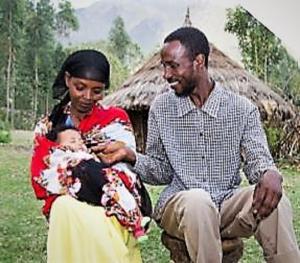Ethiopia promotes effective early childhood interventions to ensure all children survive, develop and reach their full potential
The Federal Ministry of Health (FMoH) of Ethiopia in collaboration with key sector ministries and partners is promoting effective nurturing care interventions during early childhood to ensure that every child survives and develops his or her full potential in order to be a responsible and productive citizen that contributes to the national socioeconomic growth and development.
As a priority, Ethiopia builds national capacity to better integrate and scale up early childhood development interventions and services into existing national policies, strategies and guidelines thereby ensuring that every child survives and develops to his or her full potential with a strong focus on the first 1000 days i.e. from pregnancy to 3 years of age. Responsive care giving, early stimulation through play and communication using homemade toys and opportunities for early learning are the critical interventions in CCD to promote brain development in the 0-3 years.
The first national capacity building training on Care for Child Development (CCD) has been successfully conducted in Addis Ababa, Ethiopia from 6-17 May 2019. The national Maternal and Child Health, Nutrition and Health Extension programme experts from federal Ministry of Health; regional child health experts, development partners, NGOs working on child health and development, health care providers (including paediatricians and neonatologists) from health centres and hospitals and instructors in health science/medical college have participated.
The capacity building training was organized by the FMOH in collaboration with WHO, UNICEF, USAID, PATH and African ECD Network. The training was conducted in two phases. Phase one (6-11 May 2019) included the training of 15 master trainers where the science and evidence behind CCD was discussed and appreciated. The contents of CCD and facilitation skills were also mastered. Phase two (13-17 May 2019) gave the master trainers an opportunity to use the knowledge and skills they learned to train 27 participants on CCD. The trainees included representatives from the Federal MOH, 10 Regional Health Bureaus, teaching institutions, development partners, NGOs and health care providers from health centres and Hospitals in Addis Ababa.
The WHO in collaboration with the African Early Child Development Network (AfECN) provided technical support for the training while UNICEF, USAID, PATH contributed to the local cost. WHO also provided the full set of training materials and associated job aids.
The WHO/UNICEF Care for Child Development generic training package was used for the training. The training methodology included self-learning, hands on clinical practice, role plays, group discussions and technical seminars which were highly appreciated by all trainees from both groups.
The last day, 17 May 2019, was devoted for translating knowledge into action. The discussions led by the FMOH focused on programmatic implications and immediate actions to realize CCD in the Ethiopian context. Adaptation, integration and planning for implementation were key themes discussed and debated. Results from the situation analysis on current status of ECD programming and gaps were presented and will serve as a basis for developing an ECD road map for action. Outline of a national ECD strategic plan was presented and discussed. Draft Counselling card, IEC materials and the participant manual for CCD were reviewed and suggestions made for further improvement. Finally, each participant developed and shared specific actions he /she will take to introduce and implement CCD in his/her respective health facility or programme as well as teaching institutions as soon as possible.
For further information contact:
Dr. Teshome Desta, WHO AFRO, Email: destawolde [at] who.int
Dr. Fatuma Ahmed, WHO Ethiopia, Email: fahmed [at] who.int
Mrs. Tina Asnake, MOH, Email: tina.asnake [at] moh.gov.et
